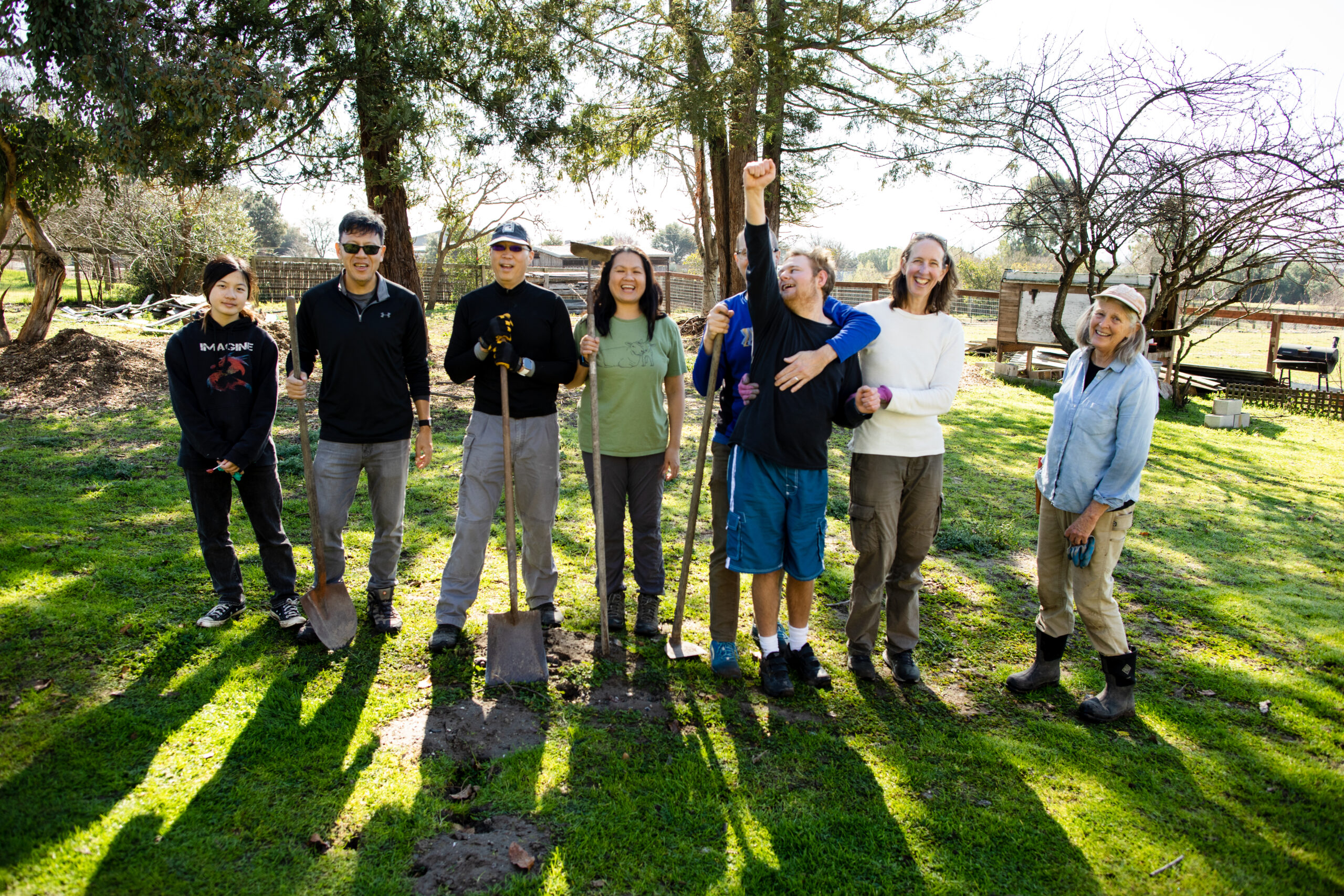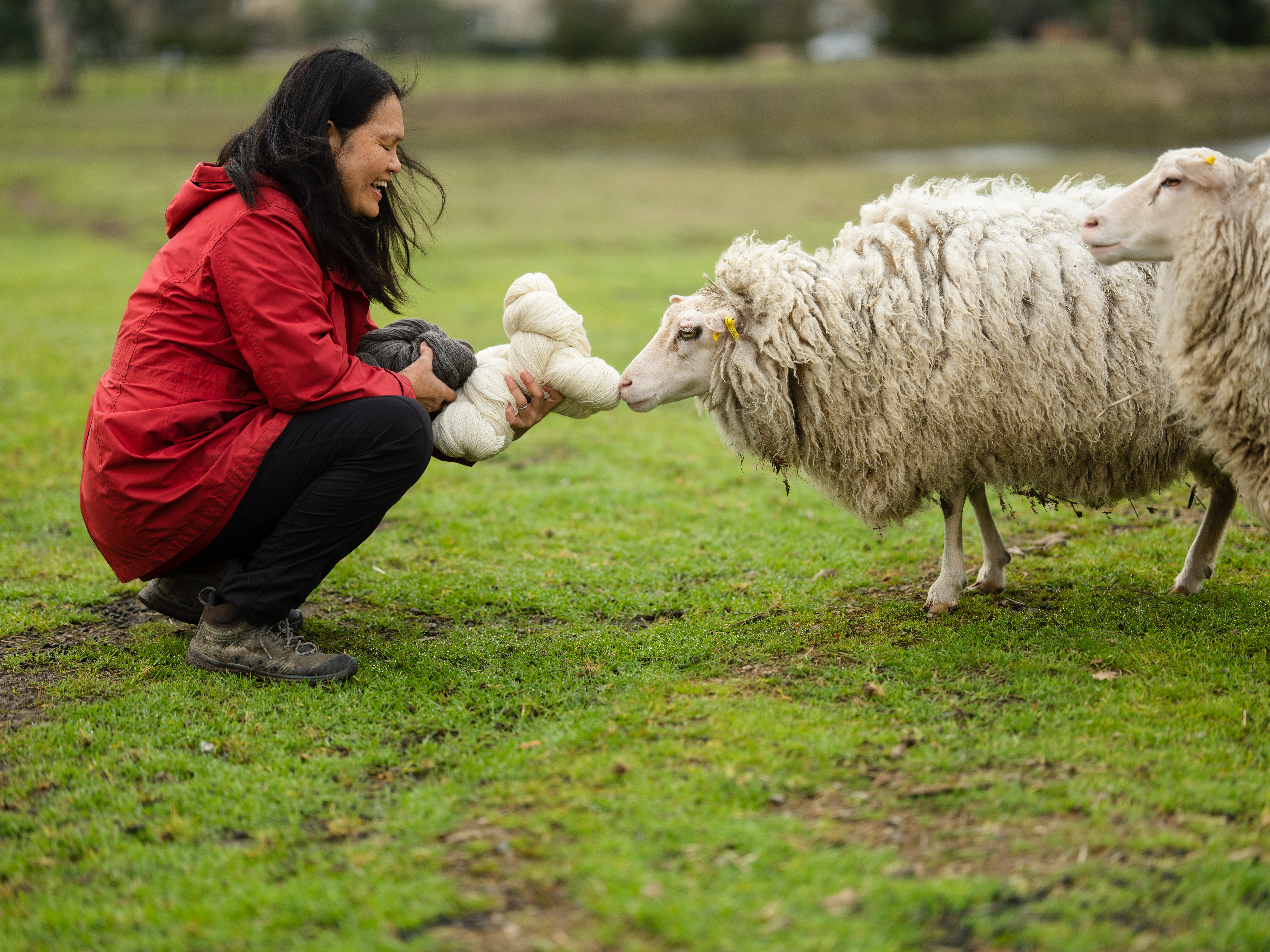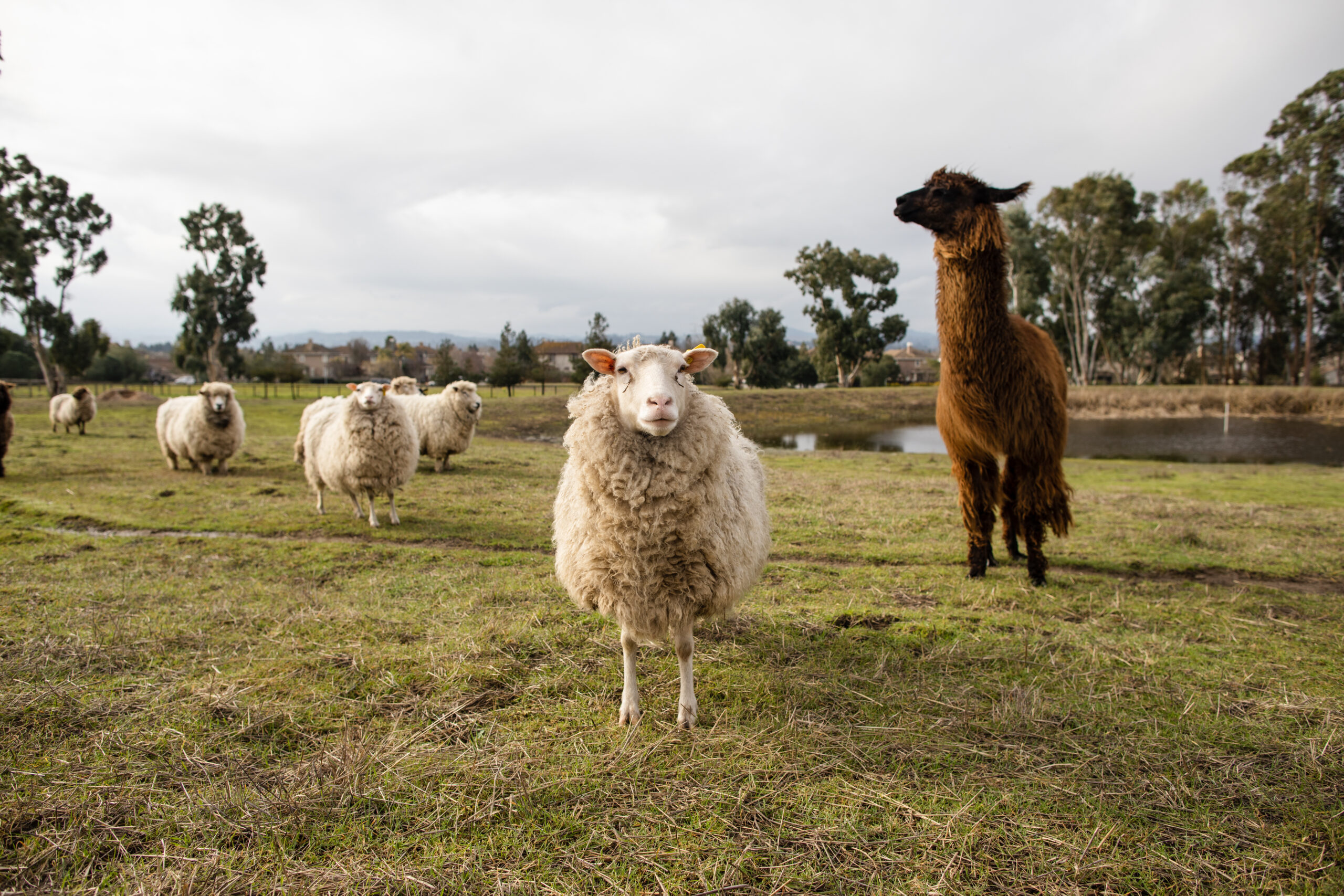Written by Stephany Wilkes. Photographed by Paige Green.

At Mustang Acres, the needs of people, animals and landscape come together in a beautiful dance of mutual care and support. Even in its early days, Mustang Acres is a lesson in adaptation and an oft-overlooked aspect of regeneration: community.
“A lot of this is accidental,” Fiona Wong says, walking toward a small flock of sheep on bright green grass, the drizzle light enough to pass for heavy fog. “It was all unplanned. I didn’t plan to have sheep. I’m a real city girl, from Singapore. I never foresaw a life with severe autism. I never foresaw a farm.”
California has long been home to intentional communities of myriad kinds, and Mustang Acres is another. It is made up of four families, five and a half acres, nine sheep, one llama, and one single-family home, nestled in the unincorporated area of East Petaluma. It will soon be home to four adult men living with profound autism, one of whom is Fiona’s son.
“It’s all about adapting to what you’re facing,” she says. “Adapting without choice. What can you do with what you’re handed? What choices do you have?”
Fiona is frank, clear-eyed and pragmatic. “We are four families who have sons with severe autism. Our adult children will live 24-7 here, with round-the-clock caregivers on-site, so we can grow old and die. We can’t wait to kick them out,” she winks, half joking like most parents of young adults. “But,” she adds, “the funny part is that while we are looking forward to the day they will live away from us, I can tell you that most of us parents are actually looking at moving to be near them after they move to Mustang Acres!”

Fiona continues, “More seriously, a lot of parents with disabled children punt on it, push that worry down. Then some get into their 60s and 70s, even their 80s, and start to panic about what will happen when they’re gone. We started building this when I was 48, three years ago. Our families didn’t know each other until two years ago, when we met and learned that we had the same dream for our disabled children. We intentionally sought to build this community together. We are like-minded parents, all from very different backgrounds but wanting to establish a sustainable system that will ensure our children’s housing and care long after we are gone.”
Fiona doesn’t say so, but she is clearly a determined, organizational powerhouse and do-er. It is one thing to think about what’s necessary for profoundly autistic adult children to outlive their parents, and entirely another to organize and make change happen. Realizing the idealistic is a lot of work and, mercifully, not entirely Fiona’s.

Mustang Acres is so named because its address is on Mustang Court, and “acres” is an old-fashioned word for farm. The four families formed a limited liability company (LLC) named Mustang Court Commons (MCC), which refers to the housing side of the project. In May 2022, Fiona incorporated Mustang Acres as a 501(c)3 nonprofit organization. Its mission is to increase access to farming by people who have intellectual and developmental disabilities, advancing social justice and equity.
Mustang Court Commons is supported by an umbrella organization called Living Unlimited, a nonprofit with a mission to provide safe and long-term housing for people with developmental disabilities. According to its website, Living Unlimited acts as a facilitator for like-minded groups of parents who are interested in a particular property.
As for the house itself, the footprint is original, but the families took it down to studs, added new siding, windows, electrical, and a fire suppression system, given the increase in wildfires. A lot of prior work was unpermitted and had to be brought up to code.
“We’re hoping the house will be ready by April,” Fiona says. “The new windows just went in. I have not seen the house look this good.” Milgard donated all of the windows after hearing about the MCC endeavor.
Fiona easily steps over mobile fencing into sheep pasture, bright green and removing the need for supplementary feed. The sheep and llama were not part of Fiona’s plan, either. In spring 2021 Susan, mother of another son who will live at Mustang Acres, asked Fiona: “Do you want six sheep?” A parent who raises sheep in nearby Sebastopol, and also has an adult son with autism, had six sheep to give.
“I said no and Susan said yes!” Fiona laughs. “We had no background in caring for sheep. We had too much on our plates with the housing aspect of the project. We didn’t need sheep in the mix. But the sheep grow on you and I can’t imagine life without them.”
Fiona introduces Hazel, the guard llama who protects the sheep as a precautionary measure. Mustang Acres has not yet had a predator issue, but nearby areas have. With close neighbors in a setting more suburban than rural, Hazel is quieter than a nocturnal livestock guardian dog but just as cautious, cleaving to the sheep and hissing a little.
Next Fiona introduces the founding flock of six sheep who arrived in May 2021: two Finns named Beans and Snowflake; two Shetlands named GreenEggs and Ham; one black Shetland-Finn cross named Lulu; and Lucy, a brown Romney. The sheep were named by Fiona’s relatives. They donated generously to the farm in its early days, providing desperately needed start-up capital for animal care, solar electric fencing, and extensive tree work to clear fire fuel load.
A few months later the initial six sheep were joined by three white Romney: Buster, Pickles and Eenie (as in “eenie, meenie, miney, mo”). They were named by the winners of a “Name Our Sheep” raffle at a spring 2022 farm day.

And the yarn they’ve all made is delectable, in big, soft hanks fresh from Valley Oak Wool Mill. Fiona will rinse the hanks so the fibers, tight off the spinner, loosen and bloom, and then wind the yarn into smaller skeins for sale.
Fibershed has provided another level of community support. Sarah Keiser, in particular, has helped everyone at Mustang Acres learn about sheep, yarn development and milling, grazing, and flock management. Fiona is still grateful for the time Sarah dropped everything and came to round up the sheep when they escaped into the neighbor’s yard and started trotting down the street.
Fiona continues, “After our first shearing Sarah said, ‘Do you want to process and sell fiber?’ I said no! But by the next shearing I had two batches of fiber and was more confident. Sarah had told me about Marcail and Valley Oak Wool Mill. Marcail did the yarn design. I sent the fleeces and she suggested blends. It is a general knitters’ yarn, two-ply, worsted and other popular knitting weights. And I LOVE IT. I labeled my batches, and now I know which yarn came from which sheep, by name.” Fiona laughs.
Fiona is now obsessed with sheep, fiber, and yarn. “I knit and crochet, but I never thought about the process behind harvesting the sheep fiber, washing, processing, and spinning it into yarn. I know so much more about fiber than I did a year ago. I can’t wait for the next shearing and am thinking about what blends we could make next.”

In the rear sheep pasture, the land slopes toward a pond. It holds water that may otherwise cause erosion onto neighboring properties, and possibly the road to Mustang Court. The pond helps regenerate the aquifer below.
“We are going to fence the pond,” Fiona explains, “because it could be a hazard. But we’ve come to realize it is a groundwater recharge pond. It captures rainwater and soaks into the aquifer. It does not run off into the watershed or sewer, and it is not used for irrigation. In 2022, it took until June for the last bit of water to disappear,” Fiona says. “The pond was dry until December.”
In December 2022 and early January 2023, atmospheric rivers brought historically heavy rainfall to Northern California.
“The pond filled to over four feet deep but sank fast,” Fiona says. “That drop-off level can’t be explained only by evaporation. I felt so hopeful that the water was going into the aquifer. The groundwater needs it.”

Two hedgerows flank the eastern and western property boundaries, funded by the Fibershed Carbon Farm Seed Fund, “which we are so grateful for,” Fiona says. “The hedgerows provide a green screen with the neighbors and privacy for our residents, as well as being habitats that will attract pollinators like bees, beneficial insects and wildlife. Before this it was barren. We mulched first and then had a few planting days.” There are starter compost bays nearby, too.
In addition, Mustang Acres hopes to implement permaculture design guidelines, build swales, and capture rooftop rainwater. A landscape architect has provided plans that include a future permitted barn by the pond, and permanent fencing to support rotational grazing plans. Until then, Mustang Acres will use white portable solar electric fence to rotate the flock.
Trails will be built for wheelchair access. Fiona says, “We want to make everything accessible to our group with intellectual disabilities, and people with physical disabilities as well.”
It is a creative vision and one with many levels of community support – the families that have come together with the help of Living Unlimited; Fibershed, Sarah Keiser and Valley Oak Wool Mill; the residents and their caretakers and neighbors; and a larger community of farm volunteers.
“We call ourselves a start-up because we are,” Fiona says. “We want a wide variety of social programs. We want friendships to happen. It’s a place where our children can wander and feel safe. Profound autism comes with dysregulation and that’s okay. You can scream your head off here, if you need to. It’s safe. This place can absorb your voice.”
If you have an adult child with disabilities who would benefit from living on a farm and close proximity to Santa Rosa Junior College and Sonoma State University, please contact Susan Riggle at Susan@living-unlimited.org.
